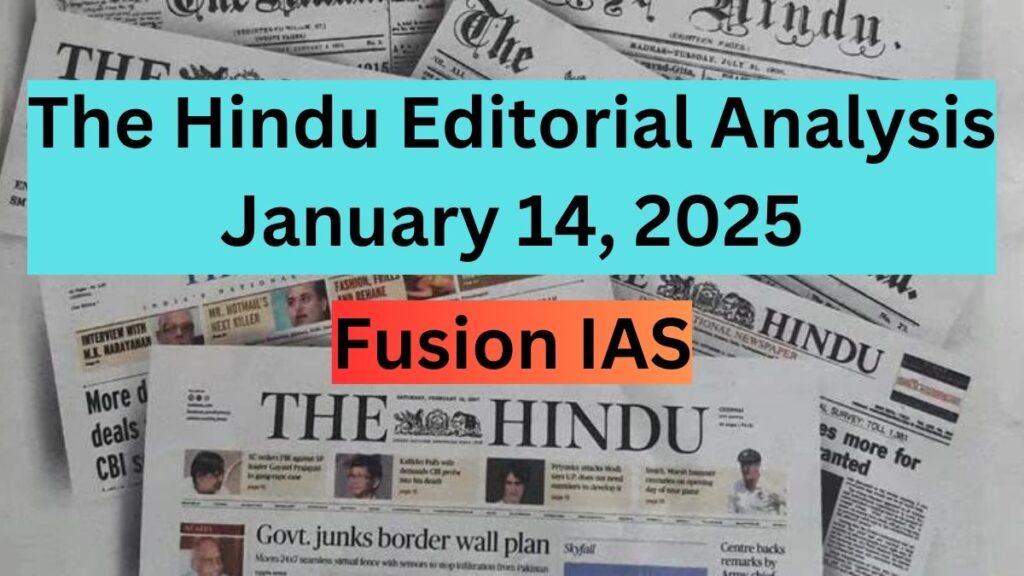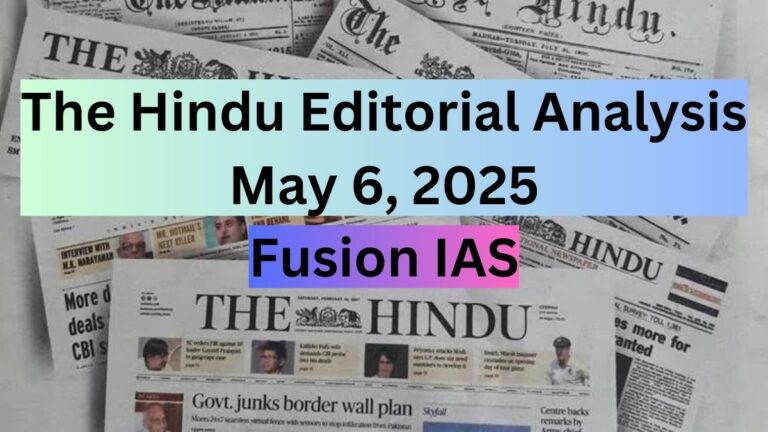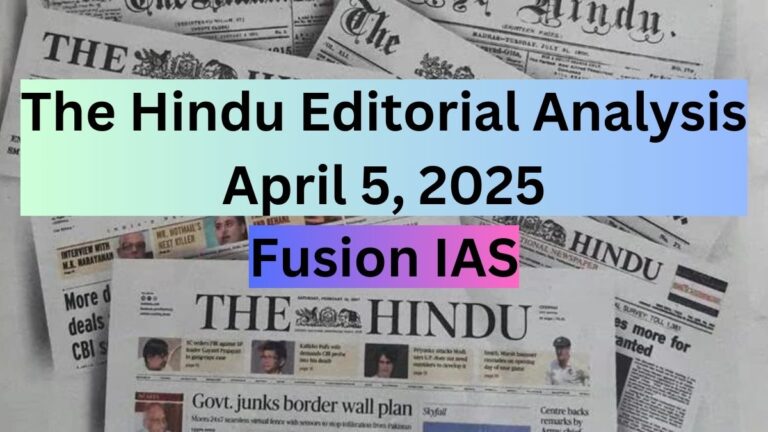
The Hindu editorials are a crucial resource for understanding key national and international issues. This analysis simplifies complex topics, highlights key points, and offers critical insights, making it an essential tool for competitive exam preparation like UPSC CSE and developing a well-rounded perspective on current affairs.
1. Indians abroad: On the 18th edition of the Pravasi Bharatiya Divas
Background and Significance of PBD
- Objective: Celebrates the contributions of the Indian diaspora and discusses issues of importance.
- Historical Context: Organized annually around January 9, marking Mahatma Gandhi’s return to India from South Africa in 1915.
- Inauguration: 18th edition inaugurated by Prime Minister Narendra Modi in Bhubaneswar, Odisha.
- Participation:
- Over 3,000 delegates from 70+ countries.
- Celebration of India’s global community, consisting of ~15.85 million NRIs and 19.57 million PIOs.
- Awards: 27 Pravasi Bharatiya Samman awards presented by President Droupadi Murmu.
Achievements of the Indian Diaspora
- Strength and Influence: Over 35 million strong diaspora known for seamless assimilation, serving local societies, and contributing to India’s growth.
- Political Influence: Indian-origin individuals hold leadership roles in over 30 countries.
- Professional Excellence: Distinguished contributions in various fields by Indians retaining their passports abroad.
Opportunities for India-Diaspora Engagement
- Viksit Bharat Programme: Focus on leveraging diaspora contributions for India’s development.
- Inclusive Ties: Importance of ensuring non-partisan, inclusive policies for diaspora engagement.
Challenges and Concerns
- Global Conflicts:
- Intractable conflicts, especially in West Asia, threaten the safety of ~9 million Indians.
- Need for enhanced safeguards and awareness for Indians in volatile regions.
- Visa and Entry Issues:
- Increasing challenges due to far-right populist governments in the West.
- The government’s role in addressing tightening visa norms.
- Economic Migration:
- Lack of domestic economic opportunities is a primary driver of migration.
- Acknowledgment of India’s “brain drain” alongside celebrating diaspora success.
- OCI Card Controversies:
- Actions against diaspora critical of the government, such as revoking OCI cards, undermine inclusivity.
Way Forward
- Broaden PBD discussions to include safeguarding diaspora interests and addressing their challenges.
- Balance celebration of achievements with strategies to create more domestic opportunities to curb migration.
- Strengthen the diaspora’s role in India’s developmental goals while maintaining inclusive and apolitical engagement.
2. Resisting transparency, eroding public trust
Context and Background
- Amendment to Rule 93(2):
- Restricts public access to election-related records.
- Limits transparency in the electoral process.
- Importance of Transparency in Elections:
- Case of vote manipulation in Chandigarh mayor elections highlighted the need for robust safeguards.
- Transparency is critical to detect and prevent electoral fraud.
- Role of the Election Commission of India (ECI):
- Expected to safeguard free and fair elections.
- Its reluctance to promote transparency raises questions about its impartiality.
Rule 93(2) Amendment: Key Implications
- Restricts Public Access:
- Previously, all election-related records except exempted ones were available for public inspection.
- New amendment limits access only to records explicitly specified.
- Potential Exclusions:
- Forms like Form 17C, video recordings, and CCTV footage may no longer be accessible.
- Concerns Over Delayed Voter Data:
- Instances of discrepancies in voter turnout figures in the 2024 general elections raised public and political concerns.
- Lack of transparency in disclosing critical data like Form 17C contributes to mistrust.
Challenges to Transparency
- ECI’s Resistance to Disclosure:
- Refused requests for Form 17C under various legal provisions.
- Arguments against sharing:
- Risk of misuse: Claim of potential image morphing.
- Technical limitations: Alleged inability to digitize records.
- Political and Public Mistrust:
- Allegations of voter turnout discrepancies in Odisha, Haryana, and Maharashtra elections.
- Political parties and candidates denied access to crucial records.
Legal and Democratic Implications
- Judicial Scrutiny:
- The Supreme Court has received challenges against the amendment.
- Historical verdicts, like striking down the electoral bonds scheme, reinforce the importance of transparency.
- Democratic Values Undermined:
- Restricting access to election-related records erodes public trust.
- Transparency is integral to ensuring public participation and confidence in the electoral process.
Way Forward
- Restoring Public Trust:
- ECI and the government must ensure proactive disclosure of critical records like Form 17C.
- Withdraw the amendment to Rule 93(2) to promote transparency.
- Technology Utilization:
- Digitize and upload election records for public access to counter allegations of manipulation.
- Strengthening Electoral Oversight:
- Increase the scope of election monitoring and ensure accountability through legal safeguards.
- Judiciary’s Role:
- Timely intervention by the judiciary to uphold democratic principles and the fundamental right to information.
3. Transforming ‘men’-talities, redefining masculinity
Context
- Despite years of advocacy, gender-based violence persists globally, with nearly 1 in 3 women experiencing violence.
- Tackling violence against women requires addressing men’s roles and questioning traditional notions of masculinity based on strength, aggression, and control.
Key Themes and Challenges
- Masculinity as a Societal Construct:
- Traditional ideas of masculinity promote dominance, emotional suppression, and control.
- These norms harm both men and women, perpetuating cycles of aggression and inequality.
- Impact of Gender Norms:
- Boys are socialized to associate strength with dominance, limiting emotional expression.
- These entrenched norms lead to suppressed emotions, strained relationships, and aggressive behaviors.
UNESCO’s Transforming MENtalities Initiative
- Objective:
- Challenges stereotypical ideas of masculinity.
- Encourages men to actively participate in fostering gender equality, not just as allies but as agents of change.
- Collaboration with ICRW:
- Report titled “Engaging Men and Boys: A Report on Pathways to Gender Equality in India” showcases 10 pioneering programs across India.
- Focus on education, dialogues, and community-driven actions to reshape gender attitudes.
Case Studies in India
- Mardon Wali Baat:
- Initiative by The YP Foundation using storytelling and social media to redefine masculinity among young men.
- Encourages respect and equality by questioning limiting narratives.
- Gender Equity Movement in Schools (GEMS):
- Collaboration with ICRW and Rajasthan’s Department of Education.
- Classroom activities help adolescents recognize the harms of toxic masculinity.
- Impact: Boys adopting equitable attitudes, such as sharing household chores.
- Dekh Rekh and Hamari Shaadi:
- Focus on men’s participation in family nutrition and planning.
- Address gender biases through everyday actions.
Role of Positive Role Models
- Public Figures and Cultural Shifts:
- Prominent figures normalizing shared responsibilities and rejecting violence foster societal change.
- Example: An Indian cricketer’s advocacy for paternity leave sparked discussions on shared parenting.
- Community Leaders:
- Local role models demonstrating equitable behavior create ripple effects in reshaping community norms.
Pathways to Change
- Promoting Reflection:
- Men need to question patriarchal privileges and explore the pressures associated with them.
- Reflecting on personal roles and reshaping attitudes is crucial for societal transformation.
- Breaking the Cycle of Violence:
- Men must actively reject toxic ideas of manhood.
- Promote values of empathy, equality, and partnership.
- Education and Engagement:
- Programs like GEMS highlight the importance of early education in shaping attitudes.
- Inclusive dialogues involving both genders foster collective understanding.
Conclusion
- Transforming masculinities is essential to achieve gender equality and eliminate violence against women.
- Men’s active participation, coupled with systemic efforts like UNESCO’s initiatives, can redefine masculinity and build an inclusive society.
- A collective commitment to challenging stereotypes and empowering all genders is the cornerstone of true equality.
4. The Trump card, global politics and outcomes for India
Global Context: The Trump Worldview
- Who is Donald Trump?
- Bold, polarising figure with a populist, deal-making approach.
- Prioritizes “America First”, emphasizing American sovereignty over global governance.
- Key Characteristics of Trump’s Policies:
- Bilateralism over Multilateralism: Withdrawal from international agreements (e.g., Paris Climate Agreement).
- Transactional Leadership: Focus on short-term practical outcomes and winner-takes-all strategies.
- Economic Protectionism: Trade wars, escalating tariffs, and competition with China.
- Implications for Global Politics:
- Rise in global polarisation: Nationalism overriding international law.
- Fractious debates on free trade, immigration, and globalisation.
- Climate policy and action downgraded, leading to instability in global markets.
- American Isolationism under MAGA:
- Reduced U.S. involvement in external conflicts.
- Encourages China and Russia to expand their global influence, creating new power alignments.
Impact on India-U.S. Relations
- Strategic Outlook:
- Warm relationship between PM Modi and Trump supports continued India-U.S. cooperation.
- Shared interest in countering China strengthens the strategic partnership.
- Opportunities for India:
- Defence Cooperation: Strengthened ties in critical technologies.
- The Quad: Reinforced as a key grouping to balance power in the Indo-Pacific.
- Challenges:
- Trade Frictions: Potential complications in economic relations due to protectionist policies.
- Strategic Autonomy: Balancing cooperation with the U.S. while maintaining independence in decision-making.
India’s Strategic Priorities
- Security and Defence:
- Border security, military modernisation, and counterterrorism are crucial.
- Vigilance against destabilising influences from China and Pakistan.
- Indo-Pacific Vision:
- Regional cooperation, multilateralism, and maintaining maritime stability are essential.
- Partnerships with Japan, Australia, EU, and ASEAN critical to counter China’s rise.
- Economic Growth:
- Energy security, diversification, and renewable energy development.
- Focus on trade and access to advanced technologies.
- Technological Advancement:
- Digital transformation, artificial intelligence, and space exploration.
- Enhancing cybersecurity against threats from hostile nations.
- Soft Power and Diplomacy:
- Promoting democratic values, pluralism, and engaging the Indian diaspora.
- Maintaining a balanced relationship with Russia to counter Sino-Russian alignment.
Conclusion
- A second Trump Presidency could usher in a disruptive and unstable global order.
- India must adapt to these shifts by reinforcing its strategic partnerships, safeguarding its interests, and maintaining a strong, independent foreign policy.
- The evolving global landscape demands a focus on balancing opportunities and challenges to secure India’s place as a major global player.
5. Presidential reprieve: On U.S. President-elect Donald Trump, the road ahead
The Legal Context: Trump’s Criminal Cases
- Key Cases and Outcomes:
- Convicted on 34 counts in New York for falsifying business records related to hush-money payments.
- Received an unconditional discharge (no jail time, fine, or probation).
- Legal immunity as President led to the withdrawal or suspension of:
- Capitol Attack Case (January 2021).
- Classified Documents Case (Florida).
- Election Tampering Case (Georgia).
- Implications of Immunity:
- The Department of Justice prohibits federal indictment and prosecution of a sitting President.
- Raises debates on legal accountability for Presidents during and after their tenure.
Broader Political Landscape
- The MAGA Movement and Polarisation:
- Trump’s campaign and presidency represent a deeply polarised America, with a breakdown of bipartisanship.
- Critical issues affected include:
- Economic and job policies.
- Reproductive rights.
- Criminal justice reform.
- Immigration policies.
- Challenges for Bipartisanship:
- Trump’s 2024 victory and control of the federal government create expectations of a more conciliatory approach.
- Failure to bridge divides may lead to long-term political instability and erosion of democratic norms.
Key Takeaways for India
- India-U.S. Relations:
- Trump’s polarising domestic policies may impact his approach to international relations.
- India must carefully navigate its strategic partnership, especially on issues like trade, defence, and counter-China strategies.
- Lessons for Governance:
- The Trump era underscores the importance of institutional accountability and checks and balances in a democracy.
- Highlights the role of bipartisan consensus in policymaking, essential for political stability.
Conclusion
The legal complexities surrounding Trump’s return to power reflect deeper systemic challenges within the U.S. democracy. For India, this underscores the need to understand the nuances of American politics and their implications on global and bilateral ties.
Disclaimer:
This analysis is based on the editorial content published in The Hindu and is intended solely for informational and educational purposes. The views, opinions, and interpretations expressed herein are those of the author of original article. Readers are encouraged to refer to the original article for complete context and to exercise their own judgment while interpreting the analysis. The analysis does not constitute professional advice or endorsement of any political, economic, or social perspective.
Follow Fusion IAS


